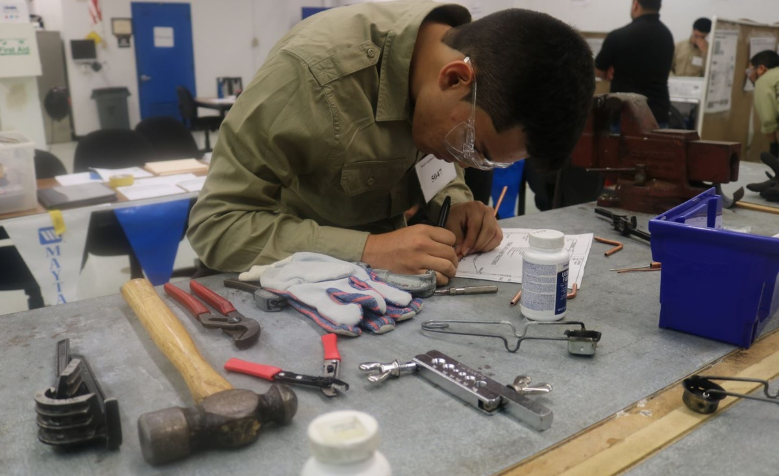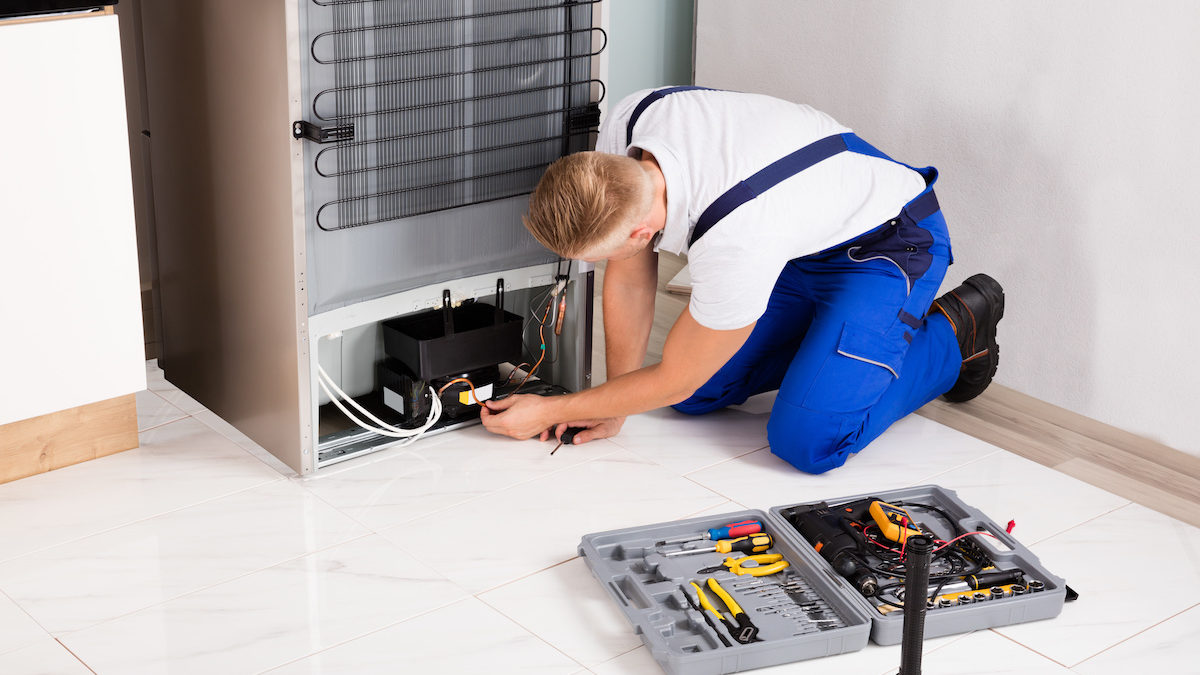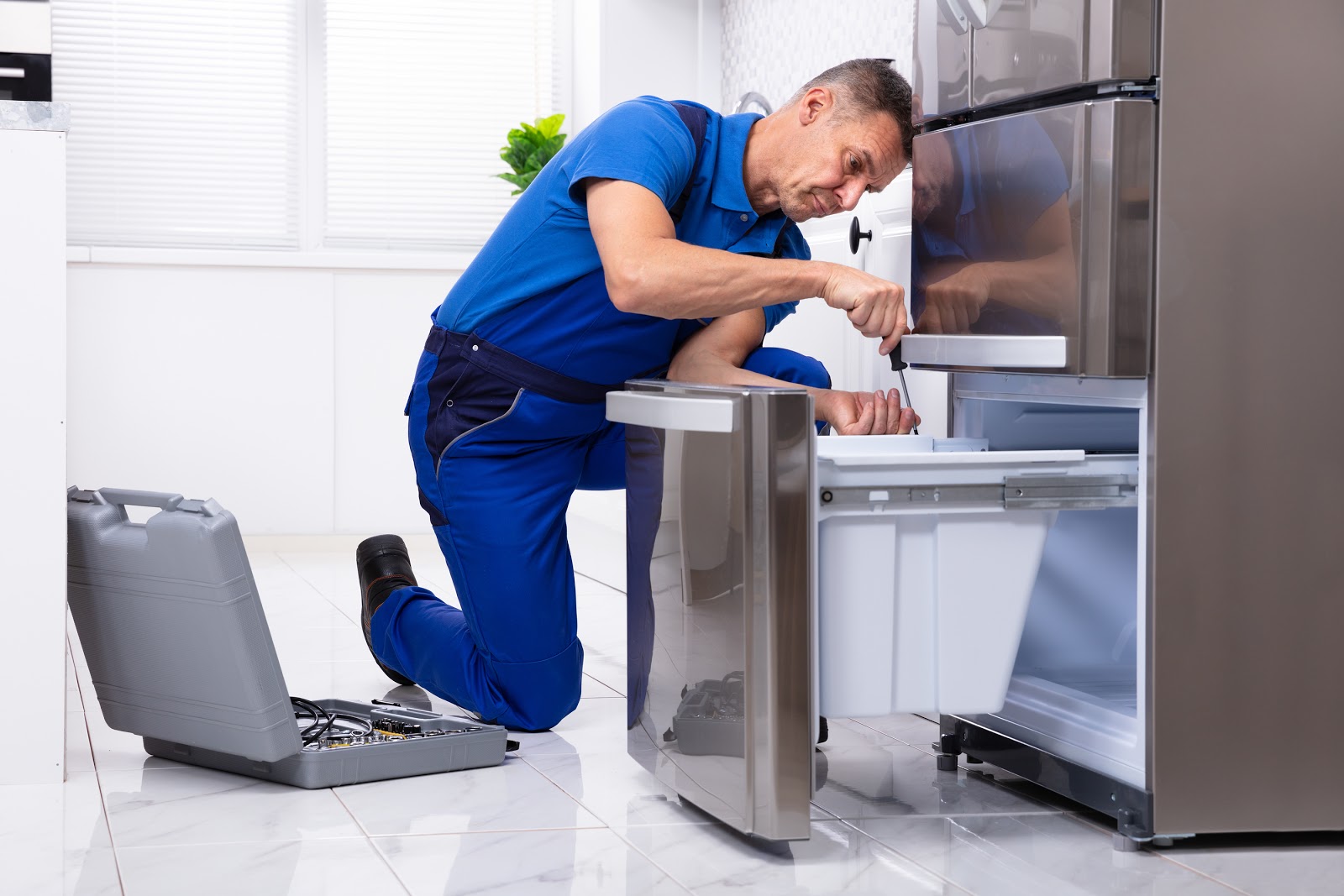Essential Tips for Effective Ref Repair Service to Expand Device Life Expectancy
When it comes to your refrigerator, appropriate fixing and maintenance are crucial for longevity. Comprehending typical issues and knowing when to act can make all the difference.
Understanding Usual Refrigerator Issues
Refrigerators are essential in maintaining your food fresh, yet they can come across an array of common problems that disrupt their efficiency. One frequent issue is insufficient cooling. If you observe food ruining quicker than usual, check the thermostat settings or take into consideration if the door seals are damaged. One more typical issue is excessive noise, which could suggest a malfunctioning compressor or a failing fan. You may likewise experience water pooling inside or beneath the fridge; this commonly results from a clogged defrost drainpipe or a malfunctioning water line. Additionally, if your fridge's light isn't functioning, maybe a basic light bulb issue or an issue with the door button. Ultimately, ice buildup in the freezer can prevent airflow and cooling effectiveness. Recognizing these problems early can save you time and money out of commission, guaranteeing your fridge runs smoothly and successfully.
Routine Maintenance Practices
To keep your appliances running smoothly, you need to stay on top of routine maintenance techniques. Clean the condenser coils, check the door seals, and monitor the temperature setups to ensure peak efficiency. These basic tasks can conserve you time and cash on repair services down the line.
Clean Condenser Coils On A Regular Basis
Cleaning your condenser coils regularly can considerably enhance your appliance's effectiveness. Dust and dust construct up on these coils over time, triggering your device to function more challenging and take in more energy. To keep them tidy, disconnect your home appliance and thoroughly get rid of any kind of safety covers.
Inspect Door Seals
Three basic steps can assist you assure your home appliance's door seals are in good problem. 2nd, tidy the seals making use of warm, soapy water to remove any debris or grime. By complying with these actions, you'll keep your device's effectiveness and durability, conserving you money on power bills and repair work in the long run.
Monitor Temperature Settings
Consistently checking your home appliance's temperature setups is crucial for finest performance and performance. Whether you're taking care of a fridge, freezer, or oven, watching on these setups can prevent many issues. For refrigerators, objective for temperatures between 35 ° F and 38 ° F; for freezers, linger 0 ° F. If the temperature levels are expensive or low, your home appliance may work harder, throwing away power and shortening its lifespan. Make use of a thermometer to examine these settings frequently, specifically after significant modifications, like moving your device or adjusting the thermostat. If you see fluctuations, readjust the setups accordingly and seek advice from the customer guidebook for assistance. By staying positive regarding temperature level monitoring, you'll assure your devices run smoothly and last longer.
Fixing Cooling Problems
When your refrigerator isn't cooling down properly, it can lead to spoiled food and lost money, so attending to the concern without delay is crucial. Begin by checking the temperature settings to confirm they're at the recommended levels, generally around 37 ° F for the refrigerator and 0 ° F for the fridge freezer. If the setups are right, inspect the door seals for any type of spaces or damage; a damaged seal can enable cozy air to go into.
Next, take a look at the vents inside the fridge and freezer. Confirm they're not blocked by food products, as this can interfere with air movement. Listen for the compressor; if it's not running or making uncommon noises, it may require focus. Lastly, inspect the condenser coils, normally located at the back or base of the unit. Dust and particles can gather, triggering cooling down issues. Clean them with a vacuum cleaner or brush to maximize efficiency. If problems persist, it might be time to call a professional.
Dealing With Water Leak and Ice Build-Up
If you're handling water leakage or ice build-up in your appliance, it's necessary to identify the resource of the issue. By identifying where the water is coming from, you can protect against more concerns and prevent expensive repair work. Allow's check out some reliable strategies to tackle these usual issues.
Recognize Leak Resources
Exactly how can you effectively determine the resources of water leak and ice accumulation in your appliances? Start by evaluating the seals and gaskets on your fridge and freezer doors. By systematically inspecting these locations, you'll determine the resource of the problem, allowing you to take the essential actions to repair it and extend your appliance's lifespan.
Stop Ice Formation
To prevent ice formation in your appliances, beginning by verifying the temperature settings are ideal. If your fridge or fridge freezer is also chilly, it can bring about excessive ice build-up. Inspect the door seals frequently; harmed seals can allow warm air in, triggering condensation and ice formation.
Keep the device well-ventilated and stay clear of congestion, as this can block air flow - Dependable Refrigeration & Appliance Repair Refrigerator repair specialist of Oro Valley. Routinely thaw your fridge freezer if it does not have an automatic defrost feature.
If you see water leak, identify and deal with any type of blocked water drainage holes, as they can add to ice build-up. Lastly, tidy the coils and confirm they're functioning effectively to keep peak efficiency. Taking these steps will certainly assist expand your device's life expectancy and efficiency.
Resolving Noisy Fridge Appears
While it could seem disconcerting, a noisy refrigerator usually signals minor concerns rather than significant malfunctions. Common perpetrators consist of the compressor, fans, and water lines.
Next, check for loosened items inside. Often, containers or racks can rattle, developing undesirable noise. Tighten or reorganize them to remove the sounds.
If you observe a clicking sound, it may my response be the defrost timer. This is commonly harmless however can suggest it requires examination.
Finally, verify your fridge is level. An out of balance appliance can produce vibrations and noise. Make use of a level to check, and adjust the feet if needed. Attending to these concerns quickly can assist preserve your refrigerator's performance and prolong its life expectancy.
When to Change Parts vs. Full Replacement

Think about the expense of repair work versus the home appliance's value. Furthermore, if you see ongoing problems that keep repeating, it's an indication that your device has actually gotten to the end of its life.
Knowing When to Call an Expert
Just how can you tell when it's time to call in an discover here expert for appliance repair work? If your appliance quits functioning altogether or often journeys circuit breakers, it's another red flag.
You need to likewise consider your own comfort level with repair services. If you're unclear concerning detecting the issue or lack the right tools, it's ideal to connect for assistance. Remember, trying challenging repair work can result in more damage or also security risks.

Regularly Asked Concerns
How Often Should I Tidy the Fridge Coils?
You ought to cleanse your refrigerator coils every six months. This aids maintain effectiveness and prevents overheating. If you see excessive dirt or animal hair, tidy them more often to ensure your refrigerator runs smoothly.

Can I Use Vinegar for Cleansing My Fridge?
Yes, you can use vinegar to cleanse your fridge! It's an exceptional all-natural cleanser that removes smells and stains. Washing Machine Repair Dependable Refrigeration & Appliance Repair Service. Simply blend it with water, use it to surface areas, and clean down for a fresh, tidy refrigerator
What Temperature level Should My Fridge Be Establish To?
You need to establish your fridge to 37 ° F(3 ° the original source C) for excellent food conservation. This temperature level maintains your food fresh while protecting against wasting, ensuring your grocery stores last longer and lowering waste. It's a very easy adjustment you can make!
Does a Fridge Required to Be Leveled?
Yes, your fridge needs to be leveled. If it's unequal, it can affect cooling performance and create excess sound. Inspect the leveling legs and readjust them to assure appropriate balance for perfect performance.
Just How Can I Lower Fridge Energy Consumption?
To decrease your refrigerator's power usage, keep it tidy and well-ventilated, examine door seals for leaks, set the temperature level between 35-38 ° F, and avoid straining it. These steps can considerably reduce your energy costs.